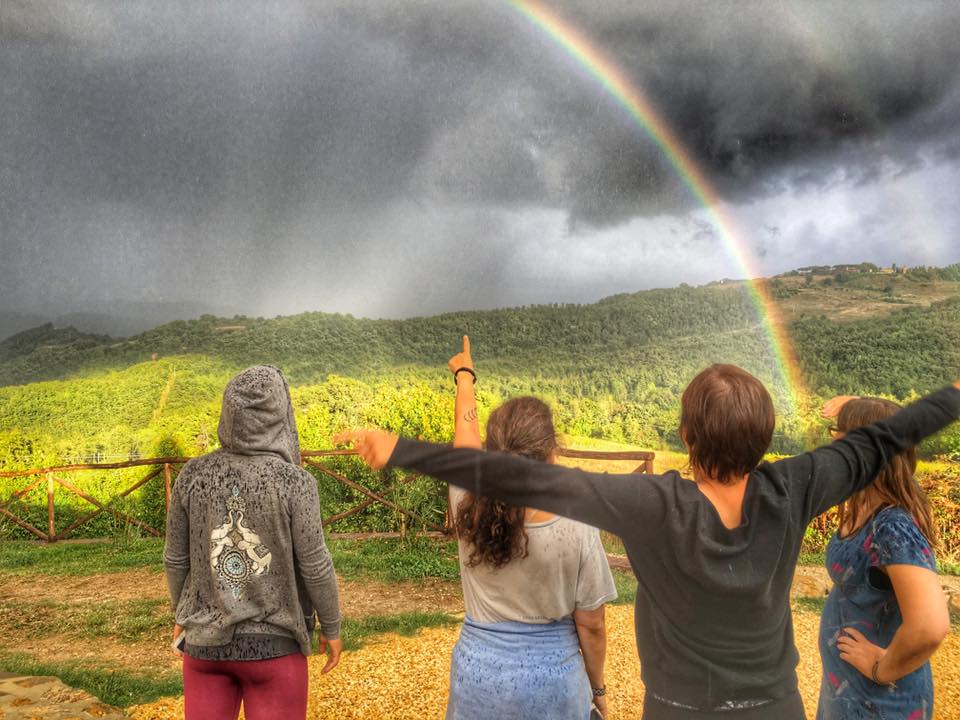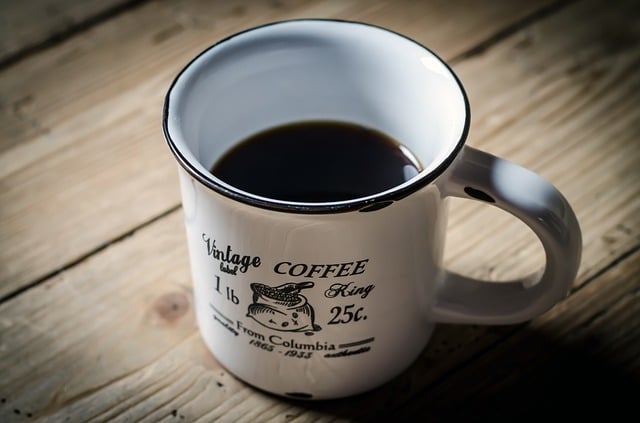By Shannon Spangler
“What if God was one of us?” – Joan Osborne, 1995
I grew up in the middle of Kansas, a place where contrails score the baby-blanket blue of the sky, but only crop dusters land, a place of wind and dust and strip malls, their parking lots littered with fast-food detritus. Money was tight but my parents were teachers, and we were rich in the currency of education. My life traced a box, its four corners home, the Baptist church, school, and the public library.
To pay for college, I waitressed graveyard at a truck-stop diner just outside the city limits. As with any new job, the first task was to learn the language. “Eighty-six on the fried chicken.” “Coffees on ten.” “Hey, bitch,” from another of the waitresses was an endearment, unless it came from Lori. “Fuck,” at least, was familiar to me (although I’d never actually used it and wouldn’t for many years), mostly as verb and adjective, but here it became a sort of adverb (“fucking running my ass off”) or noun and pronoun (“fuck-wad”).
Four summers and every school holiday, I slept days in my childhood bedroom, in a patch of sunshine framed by the cobalt, yellow and green floral curtains I sewed in high school, the garage-sale furniture I refinished in antiqued blue, a philodendron whose vines had grown to eight feet or more. My room was a bright garden within the brown and beige landscape of my ascetic parents. At dusk, my father drove me to the diner and left me as close to the back door as possible. I wondered, even then, if he imagined the sorts of things I would be exposed to, in the dark, where two highways converged at the center of the country.
One summer night, a young hitchhiker, perhaps my age or just a little older, swiveled on a stool at the diner’s counter, warming his hands around a thirty-five-cent coffee, his long hair falling in greasy ribbons below his trucker’s hat. Each time I stopped to fill his cup, he told me a little of his story, although I hadn’t asked. “Jus’ makin’ the man rich,” he said, stabbing at the air with practiced resentment, his fingers grime-engraved, a mechanic’s hand. A few years of work was more than any man owed. Between the government and the kindness of strangers, he ate. “But I ain’t no beggar.”
It was almost sunrise, near the end of a long shift, and I watched out the window for my father, who would ferry me home on his way to work. “Buy me a cinnamon roll?” the man asked. “I’m a little hungry.” The pockets of my brown polyester uniform hung heavy with change and sooty one-dollar bills. Twenty or thirty or sometimes even forty dollars. Ticket-out money.
“No,” I said, as I topped off his coffee. “I work too hard for this money.”
He laughed. “It’ll make ya old, all this workin’.” Then he took a drag on his cigarette and exhaled as though I wasn’t standing right in front of him. He was the first person I’d met who thought the world owed him something, rather than the other way around.
I filled the napkin container, poured fresh grounds into the basket of the four-burner coffee machine, leaned in, closed my eyes, and inhaled. Coffee steam mingled with the smoke that drifted from the Marlboro he’d propped on the ashtray and rose toward the tar-stained ceiling.
A few minutes later, he asked another of us. She smiled at him, warmed the cinnamon roll with extra butter, dinged open the register and dropped in fifty-five cents. She looked at me and shrugged. “He was hungry.”
Well, yeah, I thought, but was that enough? I tried to find a voice inside me that said it was, but the voice spoke instead of choices and consequences and slippery slopes and then fell silent. I turned away so that she couldn’t see the heat rise on my cheeks.
For me, the diner was a stop along the way, a means to an end. For most of the other waitresses, this was no summer job. It was life, a rural blacktop shimmering in the summer heat, the air sepia with wheat-field dust, the roadside telephone poles that lie ahead invisible, just beyond reach.
One of us was raped and murdered by a truck driver on her early morning drive home at the end of her shift. Another of us bought her husband dinner with quarters and dimes and boxed it to go. Outside, in his conversion van, she smoked a joint and turned tricks on her break while he ate biscuits and gravy and watched. One of us imagined that a UPS driver loved her, but when his route changed he never called.
Another of us smiled like Julia Roberts and thought she was in love with a cop. He and three of his night-duty cop friends would lounge in the booth nearest the door. Her cop was handsome and married with children, but she believed she’d win him if he knocked her up. The other three cops treated us like whores, and when one of them pulled me onto his lap and held me there, hard, I could feel the cold metal of the gun against my hip. They refused to chase after patrons who dined and dashed, even though they knew we were made to pay for the thieves’ dinners.
The restaurant quieted between three and five a.m. By then, the partiers had eaten eggs, vomited and departed, seeking the solace of short sleep before first shift at the meat packing plant, or a day on the car lot peddling used Pontiacs. The baker, a Winston stuck to his lower lip, fired up the ovens, and cinnamon and yeast and butter chased away diesel and booze-laced sweat. Out back or at the hotel next door, the truckers slept, rocked by the rumbling of their rigs, having burdened us with stories of wives and girlfriends and daughters, and favorite dogs who died. They tipped and handed us motel room keys that, most of the time, we dropped into a cardboard box under the counter.
This was when we would close part of the dining room, dim the lights, and fill the jukebox with quarters that played Willie and Julio singing of all the girls. We sat together at tables in the back smoking and drinking coffee and filling empty ketchup bottles and scrubbing burned coffee off the bottoms of glass pots. We talked about the group at the eight-top that tarried for three hours and left a two-dollar tip. “Fuckin’ assholes,” Julia Roberts would say.
“Take it,” another would insist as she slid a five across the table. “Had a guy who said he was Kenny Rogers. Tipped like he mighta’ fuckin’ been.”
“Shoulda’ asked for his autograph,” said another, and we laughed at the idea of Kenny Rogers, here.
But the late nights were for dreaming, and we spoke more of longings than of real life.
I loved those girls, who embraced me as one of them, although I’m certain now that my ambitions translated as arrogance, that my stories of college doubt rang trivial to these young women who looked older than their years and turned their nights into day and days into night to pay the rent and feed the kids and cover their mothers’ hospital bills. The darkened dining room induced in us a certain claustrophobia, and we spoke of the same dreams — of love, some version of escape, of more. When Julia Roberts said, “Pete ‘n me are gonna’ have five babies and a farm with horses,” another asked, “What kind of horses? I like them grey ones with spots.” They were generous that way, believers.
I nodded vaguely and said “dappled greys,” and I thought about Pete’s current wife, his real children, and judged her dream unattainable while holding tight to mine. Even now, though, I can picture her. Riding. Tall in the saddle, her auburn hair bouncing on her back.
My ticket-out money took me to college and law school, and for a time I worked in Legal Aid and tried to disabuse other young women of the idea that dreams must have a man in them. To disabuse them of the idea of abuse. I petitioned for restraining orders and imagined electrified fences instead. The courts issued official-looking papers that were forgotten as soon as the bruises faded.
The Baptist church taught me a faith I’m no longer able to cling to and a strings-attached idea of giving that put worth before want.
At the truck stop, I witnessed an easy sort of charity that was foreign to me, extended by women who seemed like they might have nothing to give. Who understood what it was to need, and to dream. Who saw, in the truckers and drunks and wanderers for whom they poured coffee, fathers and brothers and sons. Who asked only “Are you hungry?” “What kind of horses?”
Shannon Lee Spangler spent twenty-five years as a litigation attorney and wrote several technical articles for law-related publications. She lives in Lake Tahoe and writes fiction and essay.


I love this, am so in that diner.
WOW. Your story is great.
I write essays, sometimes too flowery I’m told. Your imagery, wending its way through your story and my mind, was magnificent. Thank you.
That is absolutely beautiful! I was completely there with you, Julia and Willie!
I loved it! It was exactly what I needed on a Sunday morning, cup of coffee in hand, looking for something inspiring to read. A perfect glimpse into a young girl’s mind who’s getting her first chance at embracing and learning to love some of the imperfections in the world.
Wow is right. Great writing! Your imagery (“baby-blanket blue … sky,” “the air sepia with wheat-field dust,” “diesel and booze-laced sweat”…) and insights (“They were generous that way, believers.” “a strings-attached idea of giving”), your tender reveal into the eyes of a strong woman who imagines “electrified fences instead” — packed a punch that took my breath away. I’m left feeling as if I’ve been there, in that diner, heck, worked in that diner, met those people before … You done good, Shannon. Just right. Can’t wait to read your next one …